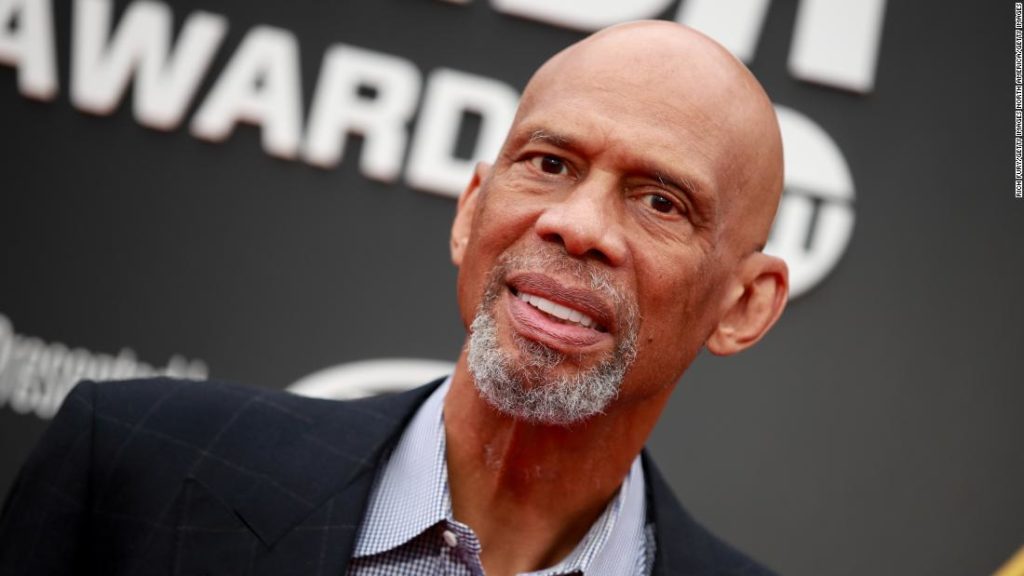Off it, Abdul-Jabbar had his eyes on a very different prize — to use his platform to highlight the importance of social issues and the need for reform.
This new annual honor will recognize a current NBA player for “pursuing social justice and upholding the league’s decades-long values of equality, respect and inclusion.”
Born in 1947, Abdul-Jabbar was 17 when he met civil rights leader Dr. Martin Luther King Jr.
“We’re dealing with voter suppression, we’re dealing with violence, we’re dealing with lack of educational opportunities, lack of adequate health care, so none of the issues have changed. It’s just the clock has kept ticking.”
Heroes at a young age
Growing up in New York, Abdul-Jabbar was open to the teachings of people who spoke about activism and change from an early age.
After converting to Islam in 1971, he changed his name from Lew Alcindor Jr. to Kareem Abdul-Jabbar. In Arabic, his name means a noble and powerful servant of Allah.
As well as Dr. King, Abdul-Jabbar remembers politician and civil rights reformer Adam Clayton Powell, Jr. as an influence and Malcolm X .
And although preferred the peaceful approach adopted by Dr. King, Abdul-Jabbar says that by choosing to speak out on social and political issues when he an athlete, he was made to “pay the price for it” and was seen as “being a little bit militant.”
However, if Abdul-Jabbar was to have his time again, he wouldn’t do anything differently. “I know I’d have the same approach. We have to change these things and it takes a commitment.”
Back in 1990, a senate race in North Carolina presented a quandary for another NBA star, Michael Jordan. Charlotte’s first African American mayor Harvey Gantt, a Democrat, was trying to unseat Republican Jesse Helms to become the state’s first black senator.
Helms had campaigned doggedly to try and prevent the senate from approving a federal holiday to honor the civil rights icon Dr. King.
Gantt lost the election, but it was Jordan’s off-the-cuff remark on the team bus — “Republicans buy sneakers too” — that defined his position in the eyes of his critics. Jordan admits that he said it, “as a joke,” but he’s been haunted by those four words for decades.
While the Chicago native, former President Barack Obama, would have preferred Jordan to enter the political fray, he has some sympathy for his stance, saying in the film: “America is very quick to embrace a Michael Jordan, an Oprah Winfrey or a justice Barack Obama, so long as it’s understood that you don’t get too controversial around broader issues of social.”
Fast forward to 2021and the debate goes on as to whether athletes should just “shut up and dribble.”
Then LAPD officers beat motorist King after he led police on a high-speed chase through Los Angeles County. A video of the incident showed police beating King more than 50 times with their batons. King suffered 11 fractures and other injuries.
The initial acquittal of the four officers involved led to huge riots in LA which left more than 50 people dead and caused nearly $1 billion in property damage.
Yet the ostracism of Colin Kaepernick, the former San Francisco 49ers quarterback who started kneeling during the national anthem to protest police brutality in 2016, and has been unsigned to a team since 2017, shows that the US appears uncomfortable with the notion of activism.
And the way Kaepernick has been treated is a lesson to the US, says Abdul-Jabbar, who is a two-time NBA Finals Most Valuable Player.
“Kaepernick got booted out of the league, but the league ended up having to make a settlement with him, and they had to admit that they were wrong to deny him his peaceful protests,” said Abdul Jabbar, who played for the Milwaukee Bucks and the Los Angeles Lakers during his storied career.
“He was doing a peaceful protest about police violence. There wasn’t anything un-American about it. People just chose to interpret it that way because they resented the fact that he was taking advantage of his opportunity to use his platform. So we have to speak the truth here, and understand what happened.”
With the rise in athletes willing to make a stand for what they believe in, Abdul-Jabbar is hopeful a shift in attitudes taking place.
“We are getting to a better place. It’s going to take continued effort, but we can get there,” said the 74-year-old.
Being recognized
The winner of the new NBA award will select an organization to receive a $100,000 contribution on their behalf. The other four finalists will each select an organization to receive a $25,000 contribution.
And after a year when NBA players and teams have taken an active role in standing up against racial injustice and voter suppression, there are lots of options to be the inaugural winner, according to Abdul-Jabbar.
“It’s hard to tell because there are so many people now that are motivated this way,” he said. “We have people that are very prominent like LeBron James, what he’s done. He’s sending a whole school district to college. There are other people that you might not know about that aren’t as prominent athletically but are still doing good things.
You may also like
-
Super League: UEFA forced to drop disciplinary proceedings against remaining clubs
-
Simone Biles says she ‘should have quit way before Tokyo’
-
Kyrie Irving: NBA star the latest to withhold vaccination status
-
Roger Hunt: English football mourns death of Liverpool striker and World Cup winner
-
‘Every single time I lift the bar, I’m just lifting my country up’: Shiva Karout’s quest for powerlifting glory

